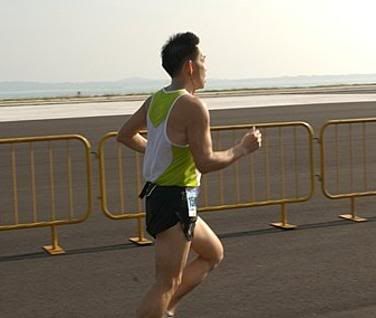Enduring Questions - Does Running Lower Your Risk Of Cancer?
-- Extracted From Runners World July2005 --
Enduring Questions - Does Running Lower Your Risk Of Cancer?
Regular exercise has many powerful, positive health benefits. But can it save your life?
by: Amby Burfoot
The day I got the call in my college dorm, I feared the news would be bad. I was a freshman, away from home for the first time in my life. Back in the town where I grew up, my mother was in the hospital with cancer. "Your dad's on the line," said my roommate. We had only one phone on the dorm floor, way down at the other end of the hallway. I remember that the walk felt long and lonely. "Mom didn't make it," my father said. "Come home as soon as you can."
That was 40 years ago, but I still get a chill whenever I hear the word "cancer." Given that cancer recently passed heart disease as the number one killer of Americans under 85, I know I'm not alone. Many runners are spooked, some directly affected. Over the last several decades, they have sought solace, hope, and courage from two running movements--the Race for the Cure series and the Team in Training programs.
I'm heartened by these programs, and inspired by their tens of thousands of participants, but cancer still scares me. Things reached a particularly low point in the early 1990s, when a number of well-known runners developed cancer. Dr. George Sheehan had prostate cancer, followed the appropriate therapies, chronicled his slowing race times in Runner's World, and died just short of his 75th birthday in November 1993. Fred Lebow, the man behind the New York City Marathon, was first diagnosed with brain cancer in 1990, but bounced back two years later to complete the 1992 New York Marathon with Grete Waitz at his side. His brain cancer recurred, however, and Lebow died in 1994 at age 62.
That same year, the superfit Steve Scott developed testicular cancer at age 38. Scott was the American record holder in the mile (3:47.69, a record he still holds). More reason to worry.
But the worst blow came from aerobics guru Ken Cooper, M.D., who made a statement to the effect that anyone running more than 15 miles a week was pursuing something more than good health, and possibly harming his or her immune system. Subtext: Maybe runners were developing cancers because they exercised too much. I was running a lot more than 15 miles a week. The Cooper statement fanned my fears.
At about the same time, kinesiologist Kerry Courneya, Ph.D., was getting worried too. His dad had contracted colon cancer at age 54, and Courneya knew that this put him at increased risk. Courneya was in his early 30s and just beginning to review the research on exercise and cancer. He's been at it ever since. "The early studies were small but encouraging," he says. "The new studies keep getting bigger and better, and the results continue to be very promising."
I'll say. In late 2002, the Journal of Nutrition published a review of 170 epidemiological studies on the relationship between physical activity and cancer. Here is some of what the researchers found. Colon cancer: Forty-three of 51 studies produced positive results (more exercise was associated with fewer cancers), with an average risk reduction of 40 to 70 percent. Breast cancer: Thirty-two of 44 studies produced positive results, with an average risk reduction of 30 to 40 percent. Prostate cancer: Fifteen of 30 studies produced a positive result, with an average risk reduction of 10 to 30 percent, particularly of the most aggressive forms. Endometrial cancer: Nine of 13 studies produced positive results, with an average risk reduction of 30 to 40 percent. Lung cancer: Eight of 11 studies produced positive results with an average risk reduction of 30 to 40 percent.
Now, I'm not a betting guy. And there are dozens of different kinds of cancers, which attack different body parts for different reasons. But these odds look pretty darn good to me. One more reason to lace up your running shoes today.
A Coping Mechanism
Even if exercise doesn't prevent cancer, it often helps people cope with the disease. Courneya has spent most of his career uncovering this relatively new perspective on cancer, and the results have been impressive. "The fact that cancer patients who exercise report less fatigue is probably the most counterintuitive and exciting part of our research," he says.
Since virtually all of us know someone who has had cancer, we all know how tough the treatments are, including pain, nausea, weakness, and depression. This doesn't sound like a good time to begin exercising, and yet studies clearly show that exercise can help. In a controlled, randomized study that appeared in a 2003 issue of the Journal of Clinical Oncology, Courneya found that breast-cancer survivors who exercised three times a week were able to raise their aerobic capacity by 17.4 percent, while nonexercisers lost 3.4 percent of theirs. More importantly, the exercisers reported more energy throughout the days, and this gave them a brighter outlook on life. In fact, according to Courneya, the exercisers had "an additional 19 hours of happiness per week, or about one additional day per week." Carpe diem.
In a study Courneya published three months ago in the Journal of Applied Physiology, he isolated a biological explanation for the success of exercise: It gives you more potent natural killer cells to fight the cancer. "Our breast cancer survivors who did moderate exercise produced the same number of natural killer cells as the nonexercisers," says Courneya, "but their killer cells had an enhanced ability to kill breast cancer cells."
It's findings like these that keep Jeff Berman exercising. Berman, featured in a Runner's World story three years ago, is the founder of FORCE (Focus on Rehabilitation and Cancer Education). Recently, he began undergoing cancer treatments for the fourth time in the last 15 years. "Cancer is a part of my life," he says. "It's with me every single day."
Berman admits that all cancer patients have bad days, himself included. "Cancer teaches you to accept life's up and downs, and to live with ambiguity," he says. "That said, one of the few constants in my life is that exercise really helps, both physically and emotionally."
Serious Thinking
Many serious runners still wonder about the effects of their 25 (and then some) miles a week. RW readers aside, runners like this are so rare, representing way less than one percent of the U.S. population, that they don't turn up in cancer studies. Still, two 2005 epidemiological studies--one with 22,000 Finnish men and 24,000 Finnish women; the other with 116,000 American nurses--found lower all-cause mortality rates, including cancer deaths, among more physically active participants. Similar studies have shown that cancer deaths generally decline as exercise levels increase.
Epidemiologist Steven Blair, the president and CEO of the Cooper Institute in Dallas, Texas, is one of the world-leading experts on exercise and longevity. While he notes that the book is still open on cancer rates among serious exercisers, he says, "In our most relevant work on this topic, we do not see any higher cancer risk in the most fit or most highly active individuals. In fact, the highest activity or fitness groups consistently had the lowest mortality rates."
Steve Scott certainly represents that pool of serious runners who are still going strong--in his case, more than 10 years after his cancer surgery. "My health is great," says Scott, now a coach at California State University, San Marcos. "I am basically cured. These days I run about 25 to 30 miles a week."
Kerry Courneya exercises every day, alternating between running and strength training. And, yes, he thinks his program will help him beat his father's colon cancer. "I absolutely believe it will reduce my risk," he says. "And that's important, because I'm in the risk group."
Me? I'm still afraid of cancer. I just had a small basal skin cancer removed from my nose. It wasn't dangerous, but it got my attention. So I'm learning to use sunscreen, and hoping that those exercise-prevents-cancer studies continue to accumulate.















0 Comments:
Post a Comment
<< Home